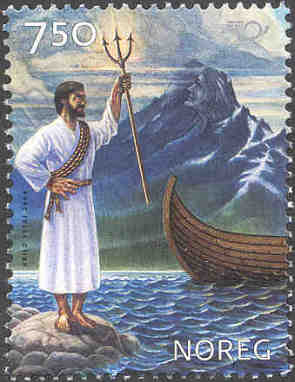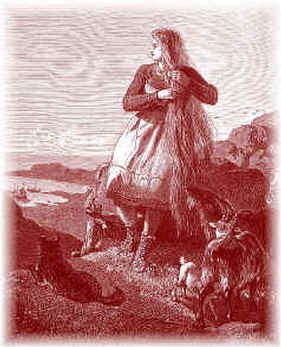
Myths of Northern Lands
By H. A. Guerber
CHAPTER VIII
NIÖRD
We have already seen how the Æsir and Vanas exchanged hostages after the terrible war they had waged against each other, and that while Hoenir, Odin's brother, went to live in Vana-heim, Niord, with his two children, Frey and Freya, definitely took up his abode in Asgard.
"In Vana-heim
Wise powers him created,
And to the gods a hostage gave."
LAY OF VAFTHRDDNIR (Thorpe's tr.)
As ruler of the winds, and of the sea near the shore, Niörd was given the palace of Nôatûn, near the seashore, where we are told he stilled the terrible tempests stirred up by Ægir, god of the deep sea.
"Niörd, the god of storms, whom fishers know;
Not born in Heaven - he was in Van-heim rear'd,
With men, but lives a hostage with the gods;
He knows each frith, and every rocky creek
Fringed with dark pines, and sands where sea fowl scream."
BALDER DEAD (Matthew Arnold)
He also extended his special protection over commerce and fishing, which two occupations could be pursued with advantage only during the short summer months, of which he was in a measure considered the personification.
The God of Summer

Niörd on a stamp from Norway Post
Niörd is represented in art as a very handsome god, in the prime of life, clad in a short green tunic, with a crown of shells and seaweed upon his head, or a broad-brimmed hat adorned with eagle or heron plumes. As personification of the summer, he was invoked to still the raging storms which desolated the coasts during the winter months. He was also implored to hasten the vernal warmth and thereby extinguish the winter fires.
As agriculture was practiced only during the summer months, and principally along the fiords or sea inlets, Niörd was also invoked for favorable harvests, for he was said to delight in prospering those who placed their trust in him.
Niörd's first wife, according to some authorities, was his sister Nerthus, Mother Earth, who in Germany was identified with Frigga, as we have seen, but in Scandinavia was considered a separate divinity. He was, however, obliged to part with her when summoned to Asgard, where he occupied one of the twelve seats in the great council hall, and was present at all the assemblies of the gods, withdrawing to Nôatûn only when his services were not required by the Æsir.
"Nôatûn is the eleventh;
There Niörd has
Himself a dwelling made,
Prince of men;
Guiltless of sin,
He rules o'er the high-built fane."
LAY OF GRIMNIR (Thorpe's tr.)
In his own home by the seashore, Niörd delighted in watching the gulls fly to and fro, and in observing the graceful movements of the swans, his favorite birds, which were held sacred to him. He spent many an hour, too, considering the gambols of the gentle seals, which came to bask in the sunshine at his feet.
Skadi, Goddess of Winter
Shortly after Idun's recovery from Thrym-heim, and Thiassi's death within the bounds of Asgard, the assembled gods were greatly surprised and dismayed to see Skadi, the giant's daughter, appear one day in their midst, demanding satisfaction for her father's death. Although the daughter of an ugly old Hrim-thurs, Skadi, the goddess of winter, was very beautiful indeed, in her silvery armor, with her glittering spear, sharp-pointed arrows, short white hunting dress, white fur leggings, and broad snowshoes, and as she confronted the gods they could not but recognize the justice of her claim, and offered the usual fine in atonement. Skadi, however, was so very angry that she at first refused this compromise, and sternly demanded a life for a life, until Loki, wishing to appease her wrath, and thinking that if he could only make those proud lips unbend enough to smile the rest would be easy, began to play all manner of pranks. Fastening a goat to himself by an invisible cord, he went through a series of antics, grotesquely reproduced by the goat; and this sight was so very comical that all the gods fairly shouted with merriment, and even Skadi was seen to smile.

Skade by Frölich. Image from the Wikimedia Commons.
Taking advantage of this softened mood, the gods pointed to the firmament where her father's eyes glowed like radiant stars in the northern hemisphere. They told her they had placed them there to show him all honor, and finally added that she might select as husband any of the gods present at the assembly, providing she were content to judge of their attractions by their naked feet.
Blindfolded, so that she could see only the feet of the gods standing in a circle around her, Skadi looked about her until she saw a pair of beautifully formed feet. She felt sure they must belong to Balder, the god of light, whose bright face had charmed her, and she designated their owner as her choice.
But when the bandage was removed, she discovered to her secret chagrin that she had chosen Niörd, to whom her troth was plighted, and with whom she nevertheless spent a very happy honeymoon in Asgard, where all seemed to delight in doing her honor. This time passed, however; Niörd took his bride home to Nôatûn, where the monotonous sound of the waves, the shrieking of the gulls, and the cries of the seals so disturbed Skadi's slumbers that she finally declared it was quite impossible for her to remain there any longer, and implored her husband to take her back to her native Thrym-heim.
"Sleep could I not
On my sea-strand couch,
For screams of the sea fowl.
There wakes me,
When from the wave he comes,
Every morning the mew (gull)."
NORSE MYTHOLOGY
(R. B. Anderson)
Niörd, anxious to please his new wife, consented to take her to Thrym-heim and dwell there with her nine nights out of every twelve, providing she would spend the remaining three with him at Nôatûn; but when he reached the mountain region, the soughing of the wind in the pines, the thunder of the avalanches, the cracking of the ice, the roar of the waterfalls, and the howling of the wolves appeared to him as unbearable as the sound of the sea had seemed to his wife, and he could not but rejoice when his time of exile was ended, and he once more found himself domiciled at Nôatûn.
"Am weary of the mountains;
Not long was I there,
Only nine nights;
The howl of the wolves
Methought sounded ill
To the song of the swans."
NORSE MYTHOLOGY
(R. B. Anderson)
Parting of Niörd and Skadi
For some time, Niörd and Skadi, who are the personifications of summer and winter, alternated thus, the wife spending the three short summer months by the sea, and he reluctantly remaining with her in Thrym-heim during the nine long winter months. But, finding at last that their tastes would never agree, they decided to part forever, and returned to their respective homes, where each could follow the occupations which custom had endeared.
"Thrym-heim it's called,
Where Thjasse dwelled,
That stream-mighty giant;
But Skade now dwells,
Pure bride of the gods,
In her father's old mansion."
NORSE MYTHOLOGY
(R. B. Anderson)
Skadi now resumed her wonted pastime of hunting, leaving tier realm again only to marry the semi-historical Odin, to whom she bore a son called Saeming, the first king of Norway, and the supposed founder of the royal race which long ruled that country.
According to other accounts, however, Skadi eventually married Uller, the winter-god. As Skadi was a skillful markswoman, she is represented with bow and arrow, and, as goddess of the chase, she is generally accompanied by one of the wolf-like Eskimo dogs so common in the North. Skadi was invoked by hunters and by winter travelers, whose sleighs she guided over the snow and ice, thus helping them to reach their destination in safety.
Skadi's anger against the gods, who had slain her father, the storm giant, is an emblem of the unbending rigidity of the ice-enveloped earth, which, softened at last by the frolicsome play of Loki (the heat lightning), smiles, and permits the embrace of Niörd (summer). His love, however, cannot hold her for more than three months of the year (typified in the myth by nights), as she is always secretly longing for the wintry storms and her wonted mountain amusements.
The Worship of Niörd
As Niörd was supposed to bless the vessels passing in and out of port, his temples were situated by the seashore; it was there that the oaths in his name were commonly sworn, and his health was drunk at every banquet, where he was invariably named with his son Frey.
As all aquatic plants were supposed to belong to him, the marine sponge was known in the North as "Niörd's glove," a name which was retained until lately, when the same plant has been popularly called the "Virgin's hand."